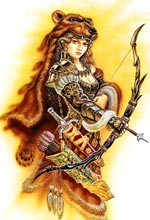
Devana was the Slavic goddess, whose characteristics were very similar to the Greek goddess Aphrodite and the Roman Diana.
As the names of Diana and Devana are very similar it is assumed that the Slavs had received this deity from the Romans. Her long name Dziewona or Dzevana, as the Poles called, is like the name of the Roman goddess of the hunt, confirming the theory that Devana was not originally a Slavic deity.
The name Devana contains the word deva which means a virgin or a young girl. The goddess of the forest certainly indicates a woman who still has something wild and unrestrained, not being possessed by a man. What else can be added about Devana? Her sacred animal was the mare, and she was considered a mare goddess. How was the wedding between Devana and Veles? Initially, the goddess was against this marriage. However, Veles found a way to placate her. Becoming a basil flower he was able to calm the wild Devana. As the wife of Veles, in Russian fairy tales Devana looks like Vasilisa, a beautiful smart girl who helps her husband to overcome many challenges. In addition to being a goddess of the forest, Devana is related to the rivers and lakes. Her tree is hazel and willow.
READ ALSO:
Dazbog was the god of fire, sun and rain
Perun is the god of the sky and thunder
Vesna was the goddess of spring
Horz is associated with the Moon
Radgost was the god of hospitality
Stribog is the god of the wind
Morana was the goddess of winter and death








